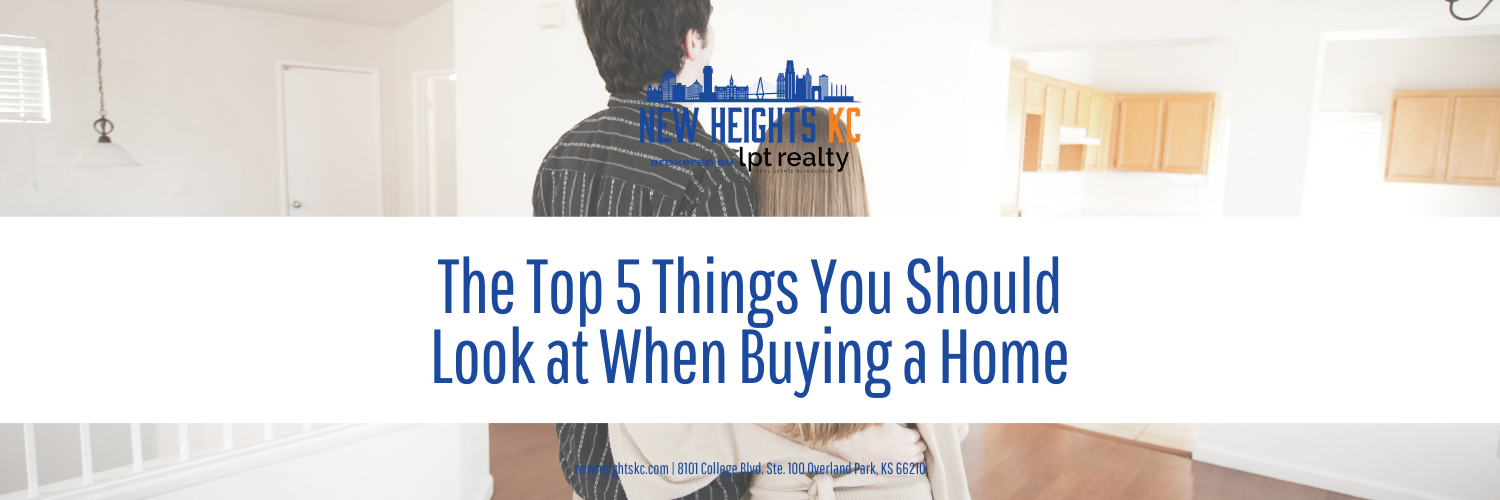The Top 5 Things You Should Look at When Buying a Home

Buying a home is one of the most significant decisions you will make in your life. Whether you’re a first-time homebuyer or an experienced investor, the process can be both exciting and overwhelming. It's essential to approach it strategically and carefully to ensure that you're not only making a sound investment but also choosing a property that suits your lifestyle, needs, and future goals. In this post, we’ll dive into the top 5 things you should look at when buying a home. From the location and the condition of the house to financial considerations, we’ll cover everything that will help you make an informed decision.
1. Location, Location, Location
When it comes to buying real estate, location is everything. You’ve probably heard this phrase many times, and for good reason. A home's location can significantly influence its value, resale potential, and overall desirability. Here are a few key factors to consider when evaluating a home's location:
Proximity to Work and Schools
For most buyers, one of the most important factors when choosing a location is its proximity to work and schools. Long commutes can be tiring and costly, so it's worth considering how far you’ll have to travel to reach your place of employment or your children’s school. Living closer to your daily routine can save time and reduce stress, which can ultimately improve your overall quality of life.
Neighborhood Safety
Safety is a top priority for many homebuyers. Researching the crime rates in the neighborhood is a crucial step in determining if it’s a safe place to live. Check local law enforcement websites or apps to see the types of crimes reported in the area. You can also ask local residents or reach out to neighborhood associations to get a better understanding of the area's safety.
Future Development Plans
Understanding the potential for future development in the area is essential when buying a home. Are there plans for new commercial buildings or a highway that could affect the peace and quiet of the neighborhood? Look into local zoning laws, government planning reports, and community projects to gauge how the area is likely to evolve over the next few years.
Amenities and Convenience
When considering a location, think about what amenities are nearby. Access to grocery stores, restaurants, parks, and public transportation can make your day-to-day life more convenient. Additionally, check whether there are any recreational areas, gyms, or cultural spots that align with your interests. Having these amenities within walking distance or a short drive away can add significant value to your home.
2. Home Condition and Structural Integrity
While you may be drawn to the aesthetics of a home, it’s crucial to assess the property’s overall condition and structure. Buying a home that looks beautiful on the surface can be a costly mistake if the structural integrity is compromised. Here are some important things to look for when assessing the condition of a house:
Foundation and Structural Issues
One of the first things you need to consider when buying a home is its foundation. A home with a solid foundation is essential for its longevity and stability. Look for visible cracks in the foundation or walls, as these could be signs of significant structural issues. You should also check for sloping floors, uneven windows, and doors that don’t close properly—these could be indications of foundation problems.
Roof and Exterior Condition
A roof replacement can cost thousands of dollars, so you need to know if the roof is in good condition. Look for signs of wear, such as missing shingles, water stains, or mold, which could indicate leaks. The exterior of the house is also important to inspect—look for signs of damage to siding, windows, or any other materials that could be costly to replace or repair.
Plumbing and Electrical Systems
The plumbing and electrical systems are essential for any home. Have a professional inspect these systems to ensure they’re up to code and functioning properly. Check for leaks in pipes, water pressure issues, and electrical outlets that don’t work or have exposed wiring. These are problems that may not be immediately visible but can cost a significant amount of money to fix.
HVAC System
The heating, ventilation, and air conditioning (HVAC) system is another critical component of a home. A properly functioning HVAC system ensures your home is comfortable year-round. Check the age and condition of the furnace and air conditioning unit, and ask for maintenance records. If the system is old or hasn’t been maintained properly, you may be facing expensive repairs or replacements in the near future.
Pro Tip: Looking for trustworthy professionals in these fields and others? Check out our trusted partners here.
3. Price and Market Conditions
Understanding the financial side of the transaction is just as important as assessing the home’s condition. Before making an offer, it’s vital to have a clear understanding of the price, financing options, and the current state of the housing market.
Pricing and Comparative Market Analysis
When you find a home you like, the next step is determining whether the asking price is reasonable. You can compare the home to similar properties in the area (a process known as comparative market analysis or CMA) to see if it's priced competitively. If the home is overpriced, you may want to negotiate or continue your search for a better deal. Conversely, if it’s underpriced, it could be a great opportunity, but be sure to investigate why.
Budgeting for the Home
It's crucial to establish a clear budget before buying a home. In addition to the purchase price, you'll need to account for closing costs, property taxes, home insurance, and any immediate repairs or upgrades the property might need. These costs can add up quickly and impact your ability to afford the home.
Mortgage Pre-Approval
Securing a mortgage pre-approval is a key step in the homebuying process. This involves providing a lender with your financial information so they can determine how much money they’re willing to lend you. Pre-approval not only helps you understand how much home you can afford, but it also shows sellers that you're a serious buyer. Without pre-approval, you could miss out on a home because you're unable to secure financing.
Understanding the Market
Whether you're buying in a seller’s market (where demand exceeds supply) or a buyer’s market (where inventory is higher than demand), understanding the current market conditions is essential. In a seller’s market, you may need to act quickly and offer above the asking price, while in a buyer’s market, you may have more room for negotiation.
4. Resale Potential
Even if you’re buying a home to live in for the long-term, it’s important to consider its resale value. Life circumstances change, and you may decide to sell the house in a few years. Assessing the home’s resale potential can help you make a sound investment. Here are a few things to look for:
Home Size and Layout
The size and layout of the home are important when it comes to resale. Generally, homes with three or more bedrooms and two or more bathrooms are more desirable to buyers. Open-concept layouts are also popular since they allow for flexible use of space. A home that is too unique in terms of layout or design may appeal to fewer potential buyers down the line.
Curb Appeal and Landscaping
First impressions matter, and a home with good curb appeal is more likely to attract buyers. Take a look at the landscaping, driveway, and exterior of the home—simple things like a fresh coat of paint, well-maintained lawns, and neat garden beds can add significant value. It’s not only about how the home looks now but how easily it can be made more attractive for future buyers.
School Districts and Local Amenities
Homes located in reputable school districts or near desirable amenities tend to have better resale value. Many buyers with children prioritize being close to good schools, and homes near parks, public transportation, shopping centers, or hospitals can also see a rise in demand.
5. Lifestyle and Long-Term Suitability
Finally, buying a home isn’t just about the present—it’s about the future. Consider how the property fits into your long-term goals, lifestyle, and family needs.
Family Planning
If you’re planning to start a family or have more children in the future, make sure the home will accommodate those plans. Do you need extra bedrooms or a larger backyard? Will the home have space for a growing family?
Aging in Place
If you plan on staying in the home for a long time, consider whether it will accommodate your needs as you age. Homes with staircases or tight hallways may not be as comfortable to navigate as you get older. Single-story homes or properties with elevators can be a better choice for those thinking long-term.
Commute and Lifestyle
If you're someone who enjoys an active lifestyle, you may want to look for homes near outdoor recreational areas, gyms, or bike paths. If you travel frequently for work or leisure, proximity to the airport or major highways may be important. Make sure your home fits your desired lifestyle and that the location supports it.
Buying a home is an exciting but often complex process, requiring a thorough assessment of various factors. By carefully evaluating the location, condition, price, resale potential, and long-term suitability of the property, you can make a well-informed decision that sets you up for success both financially and personally.
Take your time to do the necessary research and don’t hesitate to enlist the help of professionals like real estate agents, inspectors, and financial advisors. With the right approach, you can find the perfect home that fits your needs now and into the future.
Categories
Recent Posts











